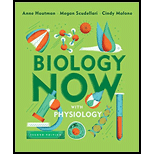
A scientific claim can be defined as the statement that express the conclusion to a problem or an answer to a question that is being investigated. The data that support the scientific claims are known as the evidences. A claim is usually given as a short sentence in length and it should be specific. The answer to any question must be given completely.
Answer to Problem 1TQ
When evaluating a scientific claim, least consideration must be given to one’s own beliefs and values. The claim should be evaluated based on the data collected.
Therefore, option b is correct.
Explanation of Solution
Justify the reasons for the correct statement:
During the evaluation of a scientific claim, high importance must be given to scientific credentials, the type of journal in which the claim has published, whether the study supporting the claim meets the standards of scientific method, any possible preconceptions of the person making the claim.
Least considerations must be given to one’s own belief and thoughts because it can result in the wrong interpretation of data. This in turn results in wrong scientific claims.
Option (b) is given as, “Your personal beliefs and values”.
Hence, the option (b) is correct.
Justify the reasons for the incorrect statements:
Option (a) is given as, “the scientific credentials of the person making the claim”.
A credential is an evidence of qualification. The scientific credentials of the person who is making a claim must be given more consideration while evaluating a claim. This is because an accurate data can be collected by a person having appropriate credentials. Hence, it is a wrong answer.
Option (c) is given as, “whether the study supporting the claim has been published in a peer-reviewed scientific journal”.
Peer reviewed journals contain data which were validated and evaluated for suitability before publication. When evaluating a scientific claim, it is important to consider and to check whether the data supporting the claim has been published in a peer-reviewed scientific journal or not. Hence, it is a wrong answer.
Option (d) is given as, “whether the study supporting the claim meets the standards of the scientific method”.
The data that supports the claim must meet the standards of the scientific method during its evaluation. It must receive more consideration during the process. Hence, it is a wrong answer.
Option (e) is given as, “any possible biases of the person making the claim”.
Any possible biases or favoritism of the individual who is making the claim should be given high importance during the evaluation of the claim. This is because the person making the scientific claim can add additional information that will be useful to the public. Hence, it is a wrong answer.
Hence, options (a), (c), (d), and (e) are incorrect.
The person who is evaluating a scientific claim should give less consideration to his own beliefs and values while evaluating a scientific claim.
Want to see more full solutions like this?
Chapter 2 Solutions
BIOLOGY NOW (LL)-W/CARROLL:STORY...
- 22. Which of the following mutant proteins is expected to have a dominant negative effect when over- expressed in normal cells? a. mutant PI3-kinase that lacks the SH2 domain but retains the kinase function b. mutant Grb2 protein that cannot bind to RTK c. mutant RTK that lacks the extracellular domain d. mutant PDK that has the PH domain but lost the kinase function e. all of the abovearrow_forwardWhat is the label ?arrow_forwardCan you described the image? Can you explain the question as well their answer and how to get to an answer to an problem like this?arrow_forward
- Describe the principle of homeostasis.arrow_forwardExplain how the hormones of the glands listed below travel around the body to target organs and tissues : Pituitary gland Hypothalamus Thyroid Parathyroid Adrenal Pineal Pancreas(islets of langerhans) Gonads (testes and ovaries) Placentaarrow_forwardWhat are the functions of the hormones produced in the glands listed below: Pituitary gland Hypothalamus Thyroid Parathyroid Adrenal Pineal Pancreas(islets of langerhans) Gonads (testes and ovaries) Placentaarrow_forward
 Human Anatomy & Physiology (11th Edition)BiologyISBN:9780134580999Author:Elaine N. Marieb, Katja N. HoehnPublisher:PEARSON
Human Anatomy & Physiology (11th Edition)BiologyISBN:9780134580999Author:Elaine N. Marieb, Katja N. HoehnPublisher:PEARSON Biology 2eBiologyISBN:9781947172517Author:Matthew Douglas, Jung Choi, Mary Ann ClarkPublisher:OpenStax
Biology 2eBiologyISBN:9781947172517Author:Matthew Douglas, Jung Choi, Mary Ann ClarkPublisher:OpenStax Anatomy & PhysiologyBiologyISBN:9781259398629Author:McKinley, Michael P., O'loughlin, Valerie Dean, Bidle, Theresa StouterPublisher:Mcgraw Hill Education,
Anatomy & PhysiologyBiologyISBN:9781259398629Author:McKinley, Michael P., O'loughlin, Valerie Dean, Bidle, Theresa StouterPublisher:Mcgraw Hill Education, Molecular Biology of the Cell (Sixth Edition)BiologyISBN:9780815344322Author:Bruce Alberts, Alexander D. Johnson, Julian Lewis, David Morgan, Martin Raff, Keith Roberts, Peter WalterPublisher:W. W. Norton & Company
Molecular Biology of the Cell (Sixth Edition)BiologyISBN:9780815344322Author:Bruce Alberts, Alexander D. Johnson, Julian Lewis, David Morgan, Martin Raff, Keith Roberts, Peter WalterPublisher:W. W. Norton & Company Laboratory Manual For Human Anatomy & PhysiologyBiologyISBN:9781260159363Author:Martin, Terry R., Prentice-craver, CynthiaPublisher:McGraw-Hill Publishing Co.
Laboratory Manual For Human Anatomy & PhysiologyBiologyISBN:9781260159363Author:Martin, Terry R., Prentice-craver, CynthiaPublisher:McGraw-Hill Publishing Co. Inquiry Into Life (16th Edition)BiologyISBN:9781260231700Author:Sylvia S. Mader, Michael WindelspechtPublisher:McGraw Hill Education
Inquiry Into Life (16th Edition)BiologyISBN:9781260231700Author:Sylvia S. Mader, Michael WindelspechtPublisher:McGraw Hill Education





